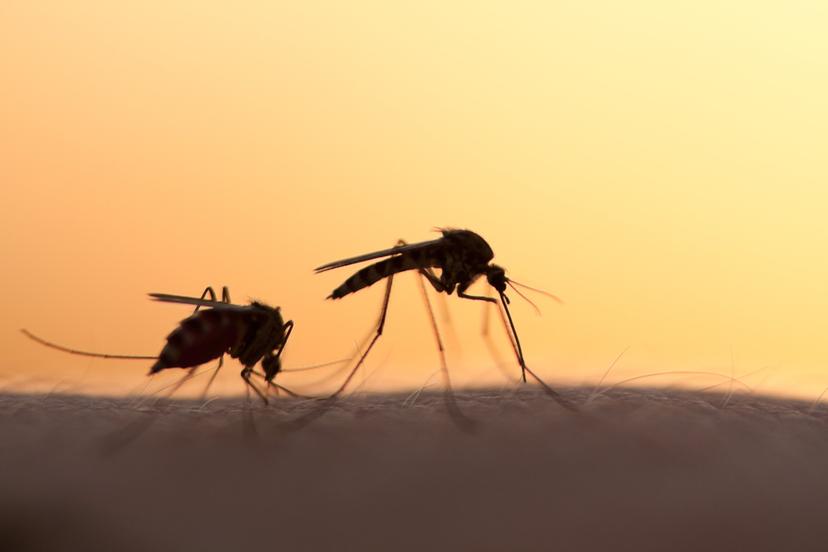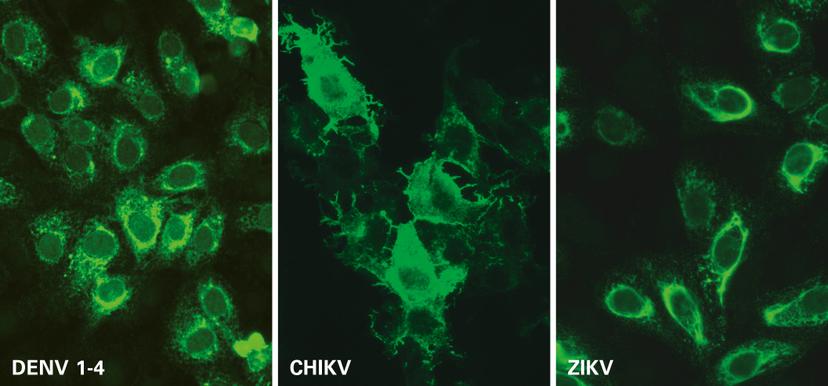Serological Diagnosis of Zika, Dengue and Chikungunya Virus Infections
27 Apr 2016
The mosquito-borne viruses Zika (ZIKV), dengue (DENV) and chikungunya (CHIKV) are spreading rapidly globally, facilitated by increased urbanization and international travel.
Infections with ZIKV, DENV and CHIKV are, however, difficult to tell apart, as they manifest with similar clinical symptoms of fever, exanthema and arthralgia and are epidemic in much the same geographic regions. Serological tests are an important method for diagnosing acute infections as well as for disease surveillance. ELISA and indirect immunofluorescence test (IIFT) systems based on optimized antigens enable sensitive and specific detection of anti-ZIKV, DENV and CHIKV antibodies in patient serum or plasma samples.
Disease Overview
Zika fever was until recently considered an obscure tropical disease, with sporadic outbreaks in countries in Africa and Asia and more recently on Pacific islands. Since 2015 the virus has been spreading explosively in South America, Central America and the Caribbean. In most cases the disease is mild. ZIKV infection has, however, been linked to complications including congenital malformations, in particular microcephaly, and neurological conditions such as Guillain-Barré syndrome. Dengue fever and chikungunya fever occur in most tropical and many non-tropical regions. Around 10% of CHIKV cases result in long-term joint pain, while about 1% of DENV infections develop into the life-threatening dengue hemorrhagic fever or dengue shock syndrome.
Serological Diagnostics
Serological tests provide a much longer window for diagnostics than direct detection methods. Virus detection by RT-PCR is only effective during the viraemic phase within the first week after symptom onset, and may already be negative by the time a patient consults a doctor. In DENV infections the Dengue Virus NS1 ELISA is an important early screening test, which helps to minimize the diagnostic gap between RT-PCR and antibody positivity.
Antibodies against ZIKV, DENV and CHIKV appear around day 4 to 7 after symptom onset. Acute infections are generally characterized by the occurrence of IgM antibodies, with IgG appearing at the same time or shortly thereafter. IgM remain detectable for several months, while IgG persist life-long. The detection of specific IgM antibodies or a significant rise in the specific IgG titer in a pair of samples taken 7 to 10 days apart is evidence of an acute infection. In a secondary flavivirus (e.g. ZIKV, DENV) infection, IgM may be delayed, of reduced intensity or not detectable at all. For detailed serological test strategies visit www.zika-diagnostics.com.
Serological methods are also useful for studying the long-term consequences of infection. For example, if the link between ZIKV infection and congenital malformations is confirmed, ZIKV serology could play an important future role in prenatal diagnostics. Serology is also useful for screening donated blood, especially in travelers returning from ZIKV, DENV and CHIKV endemic regions to non-affected countries. A further, critical role for serological studies is to monitor the growing epidemiological reach of ZIKV, DENV and CHIKV.

Indirect Immunofluorescence Test (IIFT) Results
ELISA
ELISAs provide fully automated measurement of antibody titers, and are a cost-effective method for screening large numbers of samples. They can be used to determined IgM or IgG antibodies.
- Anti-Zika Virus ELISAs are based on a recombinant non-structural viral protein (NS1) from Zika virus. This highly specific antigen avoids cross-reactivity with other flaviviruses. In a first study with these tests, the IgM and IgG ELISAs showed 100% specificity in clinically and serologically characterized samples. Furthermore, the combination of IgM and IgG ELISAs ensures highest sensitivity of 97%. Data from well characterized serum panels indicate that there is no cross-reactivity with flaviviruses like dengue, West Nile, yellow fever, tick-borne encephalitis and Japanese encephalitis viruses.
- Anti-Dengue Virus ELISAs are based on highly purified virus particles of DENV serotype 2. Due to the high structural similarity between DENV 1 to 4, use of one serotype is sufficient to detect antibodies against all four virus types. In clinically characterized sera the IgM and IgG ELISAs demonstrated 100% sensitivity and 99% specificity. They also showed very good correlation with other serological assays. Due to use of whole antigen, cross reactions with other flavivirus antibodies cannot, however, be excluded.
- Anti-Chikungunya Virus ELISAs utilize a virus-specific structural protein as the antigenic substrate. In clinically characterized samples the IgM ELISA showed 100% sensitivity for detecting acute infections. In a published comparative study, the Anti-CHIKV IgM and IgG ELISAs demonstrated the highest sensitivities of all diagnostic tests used, as well as high specificities. Further studies have confirmed with excellent overall agreement of the ELISAs with other serological assays.
Indirect Immunofluorescence
Antibody detection by IIFT is based on cells infected with the corresponding virus, which provide highly sensitive diagnostics. Positive and negative results are evaluated by fluorescence microscopy. In clinically characterized samples the IIFT substrates yielded sensitivities of 96% to 99% and specificities of 95% to 100% for the different parameters.
The Arboviral Fever Mosaic 2 consists of a combination of six substrates of cells infected with ZIKV, CHIKV and DENV serotypes 1 to 4 which are incubated in parallel. The mosaic can help in differential diagnostic delimitation of ZIKV, DENV and CHIKV infections. Due to the use of whole virus particles, cross-reactivity between antibodies against different flaviviruses, originating either from infections or vaccinations such as yellow fever, can occur. Titration of the patient sample on this mosaic may enable determination of a dominant end-point titer for the virus causing the infection.
Further Information
Visit www.zika-diagnostics.com for detailed information on ZIKV serological diagnostics and differentiation from DENV and CHIKV infections.
Image - Mosquitos-mycteria/Shutterstock
